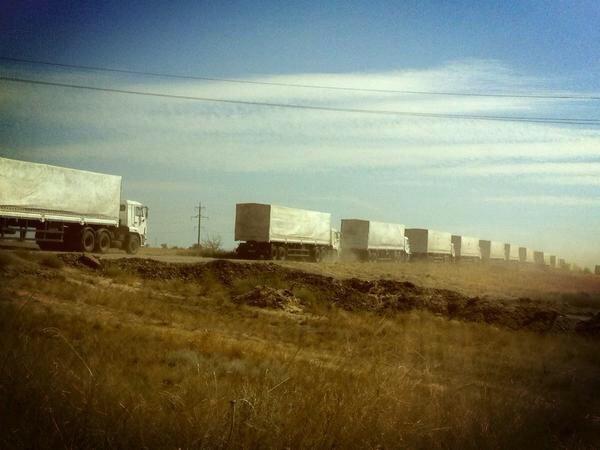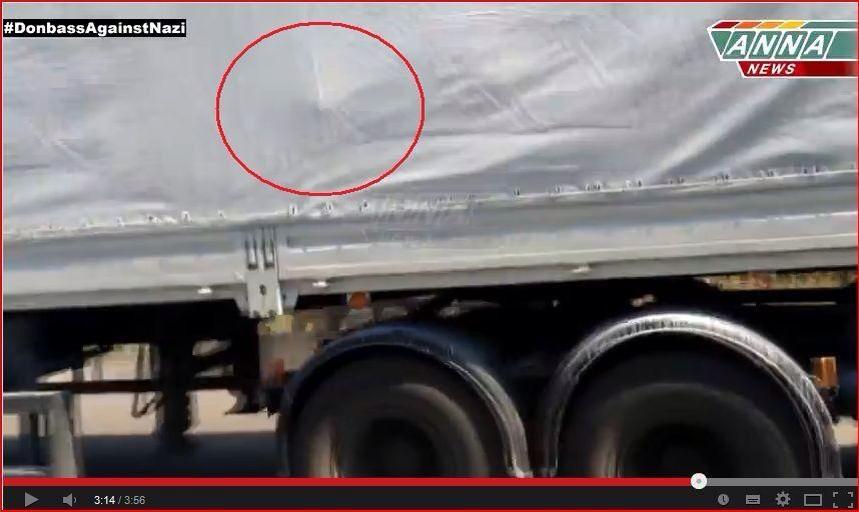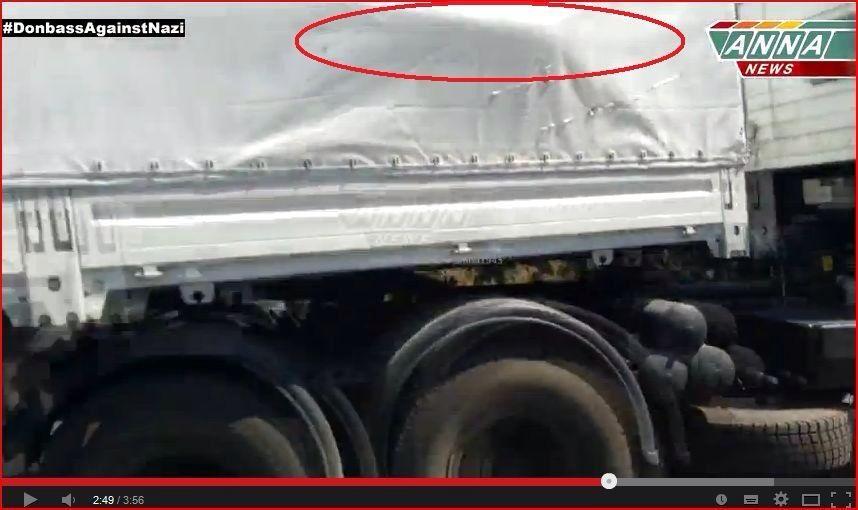
Russian media reported the humanitarian convoy to Luhansk returned to the Rostov region.(August 23rd 2014).
KIEV, Ukraine — A convoy of Russian aid trucks that had entered Ukraine without permission returned to Russia on Saturday, but Ukrainian officials continued to express alarm, saying that Russians had loaded sophisticated military equipment onto the vehicles before they left.
Col. Andriy Lysenko, Ukraine’s military spokesman, said that trucks that had driven into the territory “under the guise of humanitarian convoys” had crossed back into Russia on Saturday morning after being packed with Ukrainian-made equipment used to produce an advanced aircraft-tracking system, as well as ammunition for small arms.


Pictures of "Rrussian convoy" leaving Ukraine - definitely not empty-handed.
Russia’s defense sector, which has been hurt by European sanctions, has long been dependent on industries in Ukraine to provide parts for everything from planes to missiles. But the new charges added to tensions over the convoy. Earlier, Western officials had expressed suspicions that the trucks were bringing in small arms to replenish the rebels’ supplies, an allegation Russia has denied.
Russia sent the aid convoy into Ukraine without the approval of the Ukrainian government or the support of the International Committee of the Red Cross (ICRC), a move the Ukrainian authorities called a “direct invasion” and a “flagrant violation of international law.” Workers on the aid trucks, which had previously been stopped at the border for days, distributed food and other supplies Friday evening to the besieged city of Luhansk, part of a shrinking territory held by pro-Russian rebels in the face of an offensive by Ukrainian troops.
The latest incidents came as NATO said that Ukrainian troops were coming under Russian artillery fire from within this country’s borders Friday — its strongest denunciation of Russia’s role to date. Meanwhile, German Chancellor Angela Merkel arrived in Kiev on Saturday for talks with Ukrainian President Petro Poroshenko.
Nikolai Sinitsyn, spokesman for the Russian federal border service in the Rostov region, said the disputed aid trucks had been unloaded and “already returned to Russia,” according to the Russian news service Interfax. The trucks’ speedy exit from Ukraine would be roughly in keeping with the timeline of the ICRC’s plans to have the trucks deliver emergency supplies and immediately go back to Russia.
Russia’s Foreign Ministry hinted Saturday that the country planned to send more humanitarian aid.
“We confirm the intention to continue cooperation with the ICRC in efforts to provide humanitarian assistance to the residents of southeastern Ukraine, the need for which has by no means disappeared,” the ministry statement said. “Our assistance is still in demand.”
On Friday, the White House condemned the Russian action.
“At the same time as Russian vehicles violate Ukraine’s sovereignty, Russia maintains a sizeable military force on the Ukrainian border capable of invading Ukraine on very short notice,” National Security Council spokeswoman Caitlin Hayden said.
U.S. Air Force Gen. Philip M. Breedlove, the supreme allied commander in Europe, condemned “Russia’s illegal incursion” into Ukraine as he expressed concern about the massing of 20,000 Russian “combat-ready troops” on the border with eastern Ukraine and the flow of Russian arms and operatives to pro-Moscow separatist forces. The unauthorized convoy “indicates that Russia is more interested in resupplying separatists rather than supporting local populations,” Breedlove said in a statement.
Russia’s Foreign Ministry maintained that it acted lawfully, saying Saturday that it was “firmly guided by international legal principles of humanity and the protection of the civilian population from the effects of war.”
The move appears to have come without the approval of Kiev, which has voiced suspicions that the mission is a cover for an invasion.
On Friday, the ministry said in a statement that Moscow had run out of patience with “delays” and other “excuses” from Ukraine after a nearly 10-day standoff during which the trucks were stopped at the border. It said Ukraine’s leaders were deliberately trying to slow the delivery of aid to the Luhansk region until “there is no one at all to provide help to.”
Ukrainian officials had threatened a military response if the Russian convoy tried to force its way into this country. But state security chief Valentyn Nalyvaichenko told journalists in Kiev on Friday that Ukrainian forces would not use force against the convoy because they want to avoid “provocations.”
Merkel appeared with Poroshenko at a press conference Saturday afternoon to call for a peace agreement and to announce that Germany would be giving $660 million in aid to rebuild the infrastructure in eastern Ukraine destroyed by months of conflict and to help wounded soldiers.
“We need a peaceful solution, and we don’t want an open border that allows weapons to pass from Russia to Ukraine,” she said.
It was Merkel’s first visit to Ukraine after the bloody events earlier this year, when protesters who support the country’s closer association with the European Union were killed during demonstrations in Kiev’s Independence Square, or “Maidan.” Analysts said her visit was intended as a show of support by Europe’s most powerful leader and a rebuke to Putin, whose country has important economic ties with Germany.
Merkel had spoken to Putin and Poroshenko by phone on Friday to express her “great concern” over the unescorted convoy and to press for a cease-fire, German officials said.
Putin had told Merkel in the phone call that “explicit delays from the side of Kiev” forced Russia to send the convoy across the border unilaterally, according to Russian officials. Further delays in getting help to Luhansk residents, many of whom have no water or electricity, would be “unacceptable,” he added.
In Washington, a Pentagon spokesman, Rear Adm. John Kirby, stopped short of calling the movement an invasion but said “it strains credulity to think that this equipment’s not moving across the border accompanied by Russian forces.”
Kirby called on Russia to withdraw vehicles and personnel and threatened “additional costs and isolation” otherwise. That is a reference to potential further economic sanctions on Russia and diplomatic ostracizing of Moscow, tactics the West has applied for months with little success.
The ICRC said the convoy was delayed because of its concern for the safety of its workers in rebel-held areas.
The violence in Luhansk claimed the life of Lithuania’s honorary consul in that city, Mykola Zelenec, authorities said. Zelenec was kidnapped and “brutally killed” by rebels, Lithuanian’s foreign minister Tweeted on Friday, expressing “deep sorrow.”
Meanwhile, Russian shelling on border stations continued overnight and into the early hours of Saturday morning, Lysenko said.
“Russian artillery support — both cross-border and from within Ukraine — is being employed against the Ukrainian armed forces,” NATO Secretary-General Anders Fogh Rasmussen said in a statement Friday, accusing Moscow of a “blatant breach of Russia’s international commitments” that would intensify the crisis.
It was the strongest denunciation of Russia’s role in Ukraine that NATO has issued and the first time the alliance has accused Russian forces of firing artillery at the Ukrainian army from within Ukraine.
Poroshenko had agreed last week to let Russian and European aid into rebel-held portions of the eastern region of Luhansk, but only if ICRC workers presided over the shipments. The ICRC asked for security guarantees, which Ukraine gave — but only for areas under government control.
On Friday morning, ICRC officials told Russia that after a night of heavy shelling in Luhansk, they did not yet have the necessary safety guarantees.

No comments:
Post a Comment